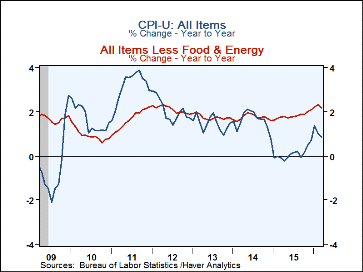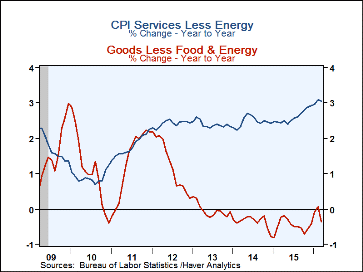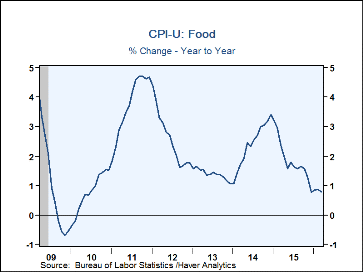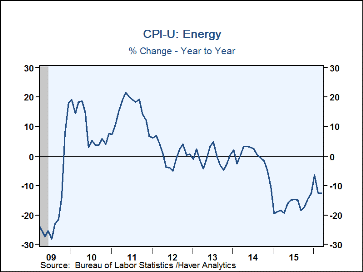 Global| Apr 14 2016
Global| Apr 14 2016U.S. CPI Lifted by Energy Prices; Core Prices Slow
by:Tom Moeller
|in:Economy in Brief
Summary
The Consumer Price Index nudged 0.1% higher (0.9% y/y) during March. It was the first increase in four months. A 0.2% rise had been expected in the Action Economic Forecast Survey. The CPI excluding food & energy also rose 0.1% versus [...]
The Consumer Price Index nudged 0.1% higher (0.9% y/y) during March. It was the first increase in four months. A 0.2% rise had been expected in the Action Economic Forecast Survey. The CPI excluding food & energy also rose 0.1% versus an expected 0.2% gain. This was the weakest m/m increase since August.
The rise in the CPI overall was driven by energy prices which rebounded 0.9% (-12.6% y/y), following three months of sharp decline. Gasoline prices gained 2.2% (-20.9% y/y), but remained 50% below the peak in October 2012. Fuel oil prices increased 1.7% (NSA, -34.8% y/y) and electricity costs gained 0.4% (-1.7% y/y). Natural gas prices declined 0.7% (-9.2% y/y).
Services prices excluding energy increased 0.2% (3.0% y/y) following two months of 0.3% gain. A 0.5% rise (3.1% y/y) in recreation services prices was accompanied by a 0.2% gain (3.2% y/y) in the cost of shelter. Rents rose 0.3% (3.7% y/y) and the owners equivalent rent of primary residences gained 0.2% (3.1% y/y). Transportation services prices rose 0.2% (2.8% y/y), but the cost of public transportation fell 0.3% (+0.3% y/y). Tuition & school fees rose 0.1% (3.2% y/y). Medical care services prices improved 0.1% (3.6% y/y) following two months of 0.5% increase.
A 0.2% decline (+0.8% y/y) in food prices offset some of these increases as it reversed the prior month's rise. Egg prices fell 5.2% (+0.7% y/y) while fruit & vegetable prices dropped 1.9% (+2.9% y/y). Dairy prices were off 0.5% (-2.8% y/y), but meat prices inched 0.2% higher (-4.0% y/y).
A further offset was provided by goods prices excluding food & energy, which also declined 0.2% (-0.4% y/y) following two months of modest gain. Appliance prices declined 0.8% (-3.4% y/y) while home furnishings & supplies costs eased 0.2% (-1.3% y/y). Recreation goods prices fell 0.3% (-2.9% y/y), led by a 2.4% falloff (-16.6% y/y) in television prices. Apparel prices fell 1.1% (-0.6% y/y) pulled down by a 2.5% drop (-3.7% y/y) in men's clothing prices. New vehicle prices remained little changed (0.4% y/y). To the upside were medical care goods prices, increasing 0.3% (2.4% y/y) after two months of stronger increase.
The consumer price data is available in Haver's USECON database while detailed figures can be found in CPIDATA. The expectations figure is from Action Economics and is found in the AS1REPNA database.
| Consumer Price Index, All Urban Consumers (%) | Mar | Feb | Jan | Mar Y/Y | 2015 | 2014 | 2013 |
|---|---|---|---|---|---|---|---|
| Total | 0.1 | -0.2 | 0.0 | 0.9 | 0.1 | 1.6 | 1.5 |
| Total less Food & Energy | 0.1 | 0.3 | 0.3 | 2.2 | 1.8 | 1.7 | 1.8 |
| Goods less Food & Energy | -0.2 | 0.3 | 0.2 | -0.4 | -0.5 | -0.3 | -0.0 |
| Services less Energy | 0.2 | 0.3 | 0.3 | 3.0 | 2.6 | 2.5 | 2.4 |
| Food | -0.2 | 0.2 | 0.0 | 0.8 | 1.9 | 2.4 | 1.4 |
| Energy | 0.9 | -6.0 | -2.8 | -12.6 | -16.7 | -0.3 | -0.7 |
Tom Moeller
AuthorMore in Author Profile »Prior to joining Haver Analytics in 2000, Mr. Moeller worked as the Economist at Chancellor Capital Management from 1985 to 1999. There, he developed comprehensive economic forecasts and interpreted economic data for equity and fixed income portfolio managers. Also at Chancellor, Mr. Moeller worked as an equity analyst and was responsible for researching and rating companies in the economically sensitive automobile and housing industries for investment in Chancellor’s equity portfolio. Prior to joining Chancellor, Mr. Moeller was an Economist at Citibank from 1979 to 1984. He also analyzed pricing behavior in the metals industry for the Council on Wage and Price Stability in Washington, D.C. In 1999, Mr. Moeller received the award for most accurate forecast from the Forecasters' Club of New York. From 1990 to 1992 he was President of the New York Association for Business Economists. Mr. Moeller earned an M.B.A. in Finance from Fordham University, where he graduated in 1987. He holds a Bachelor of Arts in Economics from George Washington University.
More Economy in Brief
 Global| Feb 05 2026
Global| Feb 05 2026Charts of the Week: Balanced Policy, Resilient Data and AI Narratives
by:Andrew Cates










